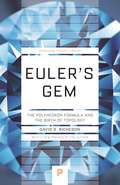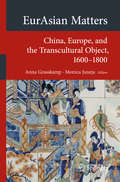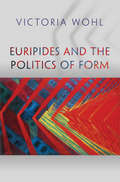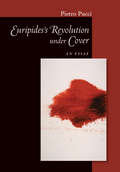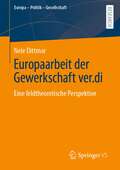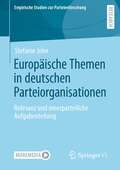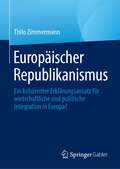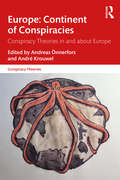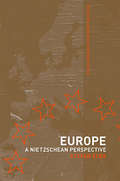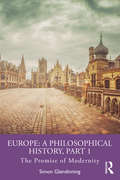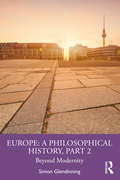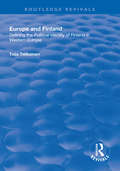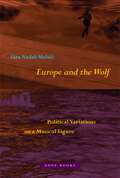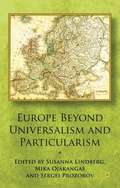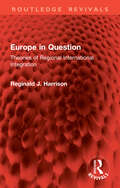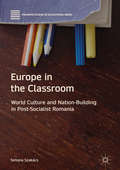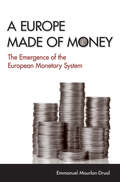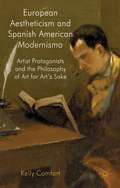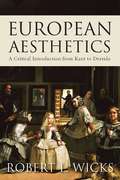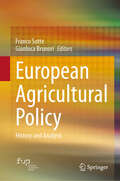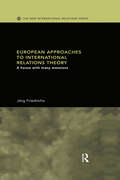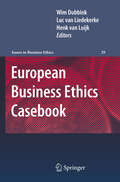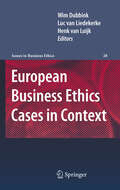- Table View
- List View
Euler's Gem: The Polyhedron Formula and the Birth of Topology
by David S. RichesonHow a simple equation reshaped mathematicsLeonhard Euler’s polyhedron formula describes the structure of many objects—from soccer balls and gemstones to Buckminster Fuller’s buildings and giant all-carbon molecules. Yet Euler’s theorem is so simple it can be explained to a child. From ancient Greek geometry to today’s cutting-edge research, Euler’s Gem celebrates the discovery of Euler’s beloved polyhedron formula and its far-reaching impact on topology, the study of shapes. Using wonderful examples and numerous illustrations, David Richeson presents this mathematical idea’s many elegant and unexpected applications, such as showing why there is always some windless spot on earth, how to measure the acreage of a tree farm by counting trees, and how many crayons are needed to color any map. Filled with a who’s who of brilliant mathematicians who questioned, refined, and contributed to a remarkable theorem’s development, Euler’s Gem will fascinate every mathematics enthusiast. This paperback edition contains a new preface by the author.
EurAsian Matters: China, Europe, And The Transcultural Object, 1600-1800 (Transcultural Research – Heidelberg Studies on Asia and Europe in a Global Context)
by Anna Grasskamp Monica JunejaThe volume examines the mutually constitutive relationship between the materiality of objects and their aesthetic meanings. Its approach connects material culture with art history, curation, technologies and practices of making. A central dimension of the case studies collected here is the mobility of objects between Europe and China and the transformations that unfold as a result of their transcultural lives. Many of the objects studied here are relatively unknown or understudied. The stories they recount suggest new ways of thinking about space, cultural geographies and the complex and often contradictory association of power and culture. These studies of transcultural objects can suggest pathways for museum experts by uncovering the multi-layered identities and temporalities of objects that can no longer be labelled as located in single regions. It is also addressed to students of art history, of European and Chinese studies and scholars of consumer culture.« This eagerly awaited volume offers deep and extensive insights into the fast-growing field of material culture studies. Its fresh approach to Eurasian objects and materialities will serve as useful reading for all scholars interested in transcultural and global studies. A very helpful introductory essay. » Sabine du Crest, University of Bordeaux Montaigne, Former Fellow, The Harvard University Center for Italian Renaissance Studies.
Euripides and the Politics of Form
by Victoria WohlHow can we make sense of the innovative structure of Euripidean drama? And what political role did tragedy play in the democracy of classical Athens? These questions are usually considered to be mutually exclusive, but this book shows that they can only be properly answered together. Providing a new approach to the aesthetics and politics of Greek tragedy, Victoria Wohl argues that the poetic form of Euripides' drama constitutes a mode of political thought. Through readings of select plays, she explores the politics of Euripides' radical aesthetics, showing how formal innovation generates political passions with real-world consequences. Euripides' plays have long perplexed readers. With their disjointed plots, comic touches, and frequent happy endings, they seem to stretch the boundaries of tragedy. But the plays' formal traits--from their exorbitantly beautiful lyrics to their arousal and resolution of suspense--shape the audience's political sensibilities and ideological attachments. Engendering civic passions, the plays enact as well as express political ideas. Wohl draws out the political implications of Euripidean aesthetics by exploring such topics as narrative and ideological desire, the politics of pathos, realism and its utopian possibilities, the logic of political allegory, and tragedy's relation to its historical moment.Breaking through the impasse between formalist and historicist interpretations of Greek tragedy, Euripides and the Politics of Form demonstrates that aesthetic structure and political meaning are mutually implicated--and that to read the plays poetically is necessarily to read them politically.
Euripides’ Revolution under Cover: An Essay (Cornell Studies in Classical Philology #65)
by Pietro PucciIn this provocative book, Pietro Pucci explores what he sees as Euripides's revolutionary literary art. While scholars have long pointed to subversive elements in Euripides’s plays, Pucci goes a step further in identifying a Euripidean program of enlightened thought enacted through carefully wrought textual strategies. The driving force behind this program is Euripides’s desire to subvert the traditional anthropomorphic view of the Greek gods—a belief system that in his view strips human beings of their independence and ability to act wisely and justly. Instead of fatuous religious beliefs, Athenians need the wisdom and the strength to navigate the challenges and difficulties of life.Throughout his lifetime, Euripides found himself the target of intense criticism and ridicule. He was accused of promoting new ideas that were considered destructive. Like his contemporary, Socrates, he was considered a corrupting influence. No wonder, then, that Euripides had to carry out his revolution "under cover." Pucci lays out the various ways the playwright skillfully inserted his philosophical principles into the text through innovative strategies of plot development, language and composition, and production techniques that subverted the traditionally staged anthropomorphic gods.
Europa von A bis Z: Taschenbuch der europäischen Integration
by Werner Weidenfeld Wolfgang Wessels Funda TekinDieses Taschenbuch bietet Europa zum Nachschlagen: In über 100 Sachbeiträgen erklären renommierte EuropaexpertInnen wissenschaftlich fundiert und zugleich verständlich alle wichtigen Themen und Begriffe aus Politik, Wirtschaft und Geschichte der europäischen Einigung. Es erscheint in aktualisierter und erweiterter Fassung schon in der 16. Auflage und richtet sich an alle Europa-Interessierten, die sich gezielt und zuverlässig über den neuesten Stand in europapolitischen Fragen informieren wollen.Das Taschenbuch „Europa von A bis Z“ wird freundlicherweise vom Auswärtigen Amt gefördert. Das Institut für Europäische Politik (IEP) wird im Rahmen des Citizens, Equality, Rights and Values Programms 2021–2027 der Europäischen Union gefördert. Für die Inhalte zeichnet allein das IEP verantwortlich.
Europaarbeit der Gewerkschaft ver.di: Eine feldtheoretische Perspektive (Europa – Politik – Gesellschaft)
by Nele DittmarIn der sozialwissenschaftlichen Debatte wird oft ein pessimistisches Bild der Bedingungen und Perspektiven europäischen gewerkschaftlichen Handelns gezeichnet. Selten wurde aber bisher in eine nationale Gewerkschaft hineingeschaut und gefragt, ob und inwiefern die innergewerkschaftlichen (Macht-)Verhältnisse ihre europabezogene Arbeit beeinflussen. Diese Arbeit setzt dort an und lenkt auf der Suche nach den Möglichkeiten und Grenzen gewerkschaftlicher Interessenvertretung in Europa den Blick in eine nationale Gewerkschaft hinein. Am Beispiel der Vereinten Dienstleistungsgewerkschaft ver.di bringt dies einerseits europabezogene Praktiken zum Vorschein, die aus einer Makroperspektive verdeckt bleiben. Andererseits werden neue Erkenntnisse zu Hindernissen gewerkschaftlicher Europaarbeit gewonnen, die in den innerorganisatorischen Strukturen und Machtrelationen selbst begründet sind. Für den Blick in die Gewerkschaft wird in dieser Arbeit eine feldtheoretische Perspektive eingenommen. Damit wird ihre „Europaarbeit“ durch das Zusammenspiel der Position der Gewerkschaft in anderen Feldern (wie dem der deutschen und der europäischen Arbeitsbeziehungen) und den Kräfteverhältnissen innerhalb der Gewerkschaft selbst erklärt.
Europäische Themen in deutschen Parteiorganisationen: Relevanz und innerparteiliche Aufgabenteilung (Empirische Studien zur Parteienforschung)
by Stefanie JohnStefanie John untersucht, in welcher Weise sich die Vielfalt europäischer politischer Angelegenheiten in der Politikartikulation von ausgewählten deutschen Parteien niederschlägt und ob innerhalb der Parteien eine Art Aufgabenteilung existiert, wonach zentrale innerparteiliche Akteure unterschiedliche europäische Themen zum Gegenstand ihrer Politikartikulation machen. Konkret wird hier die Politikartikulation von Parteitag, Parteiführung und Fraktion theoretisch reflektiert und empirisch untersucht. Die empirische Untersuchung beruht auf einer umfänglichen Analyse politischer Dokumente und deckt einen Analysezeitraum von zehn Jahren ab. Es kommen unter anderem neu entwickelte Indizes zum Einsatz, um Muster einer innerparteilichen Aufteilung von politischen Themen aufzudecken. Es zeigt sich, dass sich in der Politikartikulation der drei Parteiakteure die europäische Themenvielfalt widerspiegelt, die von Polity-Fragen bis zu Policy-Themen in zahlreichen Politikfeldern reicht. Aufgedeckte Muster belegen die Existenz einer innerparteilichen Aufgabenteilung in der Politikartikulation. Diese Muster zeigen sich in weiten Teilen unabhängig vom Parteiorganisationsverständnis der Parteien.
Europäischer Republikanismus: Ein kohärenter Erklärungsansatz für wirtschaftliche und politische Integration in Europa?
by Thilo ZimmermannIn diesem Buch werden die aktuellen Theorien der europäischen Integration, wie Föderalismus, Neofunktionalismus und liberaler Intergouvernementalismus, mit ihren Stärken und Schwächen vorgestellt. Es wird dann argumentiert, dass die Kombination der republikanischen Theorie mit der Theorie des öffentlichen Gutes, der res publica der öffentlichen Güter, die europäische Integration besser erklären könnte. Die Theorie der öffentlichen Güter muss jedoch übernommen werden, um sie auf den europäischen Republikanismus anwendbar zu machen. Schließlich zeigt das Buch, wie dieser neue Rahmen weitere akademische Debatten beeinflussen kann, z. B. über Souveränität und Währungsintegration, externe Effekte eines gemeinsamen europäischen Marktes und die treibende Kraft der europäischen Integration. Da der republikanische Ansatz nicht einer rein wirtschaftlichen Logik folgt, bleibt Raum für politische Überlegungen und Motivationen. In diesem aktuellen und interdisziplinären Buch verbindet der Autor viele wichtige Stränge der europäischen Integrationstheorie, der Geschichte, der Ökonomie und der Politikwissenschaften, die klar zu einem kohärenten analytischen Diskurs zusammengeführt werden. Seine Stärke liegt in der interdisziplinären Interaktion zwischen Politik und Wirtschaft sowie in theoretischen und praktischen Fragen, die für die öffentliche Debatte in Europa von hoher Relevanz sind. Dieses Buch wird für Wissenschaftler und Studenten von Interesse sein, die sich für wirtschaftliche Integration sowie für Geschichte und politische Philosophie interessieren.
Europe: Conspiracy Theories in and about Europe (Conspiracy Theories)
by dreas Önnerfors and André KrouwelThis edited volume investigates for the first time the impact of conspiracy theories upon the understanding of Europe as a geopolitical entity as well as an imagined political and cultural space. Focusing on recent developments, the individual chapters explore a range of conspiratorial positions related to Europe. In the current climate of fear and threat, new and old imaginaries of conspiracies such as Islamophobia and anti-Semitism have been mobilised. A dystopian or even apocalyptic image of Europe in terminal decline is evoked in Eastern European and particularly by Russian pro-Kremlin media, while the EU emerges as a screen upon which several narratives of conspiracy are projected trans-nationally, ranging from the Greek debt crisis to migration, Brexit and the COVID-19 pandemic. The methodological perspectives applied in this volume range from qualitative discourse and media analysis to quantitative social-psychological approaches, and there are a number of national and transnational case studies. This book will be of great interest to students and researchers of extremism, conspiracy theories and European politics.
Europe: A Nietzschen Perspective (Routledge Advances in European Politics #Vol. 11)
by Stefan ElbeThere has been a deliberative, but as yet unsuccessful, attempt by scholars and policy makers to articulate a more meaningful idea of Europe, which would enhance the legitimacy of the European Union and provide the basis for a European identity. Using a detailed analysis of the writings of Nietzsche, Elbe seeks to address this problem and argues that Nietzsche's thinking about Europe can significantly illuminate our understanding. He demonstrates how Nietzsche's critique of nationalism and the notion of the 'good European' can assist contemporary scholars in the quest for a vision of Europe and a definition of what it means to be a European citizen.
Europe: The Promise of Modernity
by Simon GlendinningEurope is inseparable from its history. That history has been extensively studied in terms of its political history, its economic history, its religious history, its literary and cultural history, and so on. Could there be a distinctively philosophical history of Europe? Not a history of philosophy in Europe, but a history of Europe that focuses on what, in its history and identity, ties it to philosophy. In the two volumes of Europe: A Philosophical History - The Promise of Modernity and Beyond Modernity - Simon Glendinning takes up this question, telling the story of Europe’s history as a philosophical history. In Part 1, The Promise of Modernity, Glendinning examines the conception of Europe that links it to ideas of rational Enlightenment and modernity. Tracking this self-understanding as it unfolds in the writings of Kant, Hegel and Marx, Glendinning explores the transition in Europe from a conception of its modernity that was philosophical and religious to one which was philosophical and scientific. While this transition profoundly altered Europe’s own history, Glendinning shows how its self-confident core remained intact in this development. But not for long. This volume ends with an examination of the abrupt shattering of this confidence brought on by the first world-wide war of European origin – and the imminence of a second. The promise of modernity was in ruins. Nothing, for Europe, would ever be the same again. Part 2: Beyond Modernity is available now from Routledge. ISBN 9781032015828
Europe: Beyond Modernity
by Simon GlendinningEurope is inseparable from its history. That history has been extensively studied in terms of its political history, its economic history, its religious history, its literary and cultural history, and so on. Could there be a distinctively philosophical history of Europe? Not a history of philosophy in Europe, but a history of Europe that focuses on what, in its history and identity, ties it to philosophy. In the two volumes of Europe: A Philosophical History – The Promise of Modernity and Beyond Modernity – Simon Glendinning takes up this question, telling the story of Europe’s history as a philosophical history. In the wake of two world wars of European origin, Europe’s modern promise of universal peace, freedom and well-being for all humanity lay in ruins. In Part 2, Beyond Modernity, Glendinning picks up the story of this promise after the Second World War. Taking in Isaiah Berlin’s defence of a pluralist ideal, Francis Fukuyama’s vision of a new ‘end of history’ in liberal democracy, and Jacques Derrida’s critique of the very idea of an end of history, Glendinning invites us to affirm a new philosophical-historical self-understanding: not the history of the rational animal on the way to its final end, with Europe at the head, but a history of the unpredictably self-transforming animal without a final end. In this context, Glendinning argues, Europe remains promising, its cosmopolitan heritage opening a future beyond its exhausted modernity. Part 1: The Promise of Modernity is available now from Routledge. ISBN 9781032015804
Europe and Empire: On the Political Forms of Globalization (Commonalities)
by Massimo CacciariThe European Union and the single currency have given Europe more stability than it has known in the past thousand years, yet Europe seems to be in perpetual crisis about its global role. The many European empires are now reduced to a multiplicity of ethnicities, traditions, and civilizations. Europe will never be One, but to survive as a union it will have to become a federation of “islands” both distinct and connected.Though drawing on philosophers of Europe’s past, Cacciari calls not to resist Europe’s sunset but to embrace it. Europe will have to open up to the possibility that in few generations new exiles and an unpredictable cultural hybridism will again change all we know about the European legacy. Though scarcely alive in today’s politics, the political unity of Europe is still a necessity, however impossible it seems to achieve.
Europe and Finland: Defining the Political Identity of Finland in Western Europe (Routledge Revivals)
by Teija TiilikainenFirst published in 1998, this volume asked the question, what is Europe?. What is Finland’s position in Europe?. The author tries to give an answer to these questions by defining first Europe in terms of its key political traditions and then locating Finland into this map of historical ideas. The ultimate purpose of this analysis of historical ideas is very pragmatic as it tries to find an answer to the core problems of European unification. Why are different European countries at differing levels of readiness as far as the project of unification is concerned?. The answer can be found again in political traditions.
Europe and the Wolf: Political Variations on a Musical Figure
by Sara Nadal-MelsióHow the work of several contemporary artists illuminates and challenges the policing of European borders and identityIn this stunningly original book, Sara Nadal-Melsió explores how the work of several contemporary artists illuminates the current crisis of European universalist values amid the brutal realities of exclusion and policing of borders. The &“wolf&” is the name Baroque musicians gave to the dissonant sound produced in any attempt to temper and harmonize an instrument. Europe and the Wolf brings this musical figure to bear on contemporary aesthetic practices that respond to Europe&’s ongoing social and political contradictions. Throughout, Nadal-Melsió understands Europe as a conceptual problem that often relies on harmonization as an organizing category. The &“wolf&” as an emblem of disharmony, incarnated in the stranger, the immigrant, or the refugee, originates in the Latin proverb &“man is a wolf to man.&” This longstanding phrase evokes the pervasive fear, and even hatred, of what is foreign, unknown, or beyond the borders of a community. The book follows the &“wolf&” in a series of relays between the musical, the visual, and the political, and through innovative readings of artworks—by, among others, Carles Santos, Pere Portabella, Allora&Calzadilla, and Anri Sala. Traversed by the musical, these artworks, as well as Nadal-Melsió&’s writing, present unstable symbolic and material ensembles in an array of variations of political possibilities and impossibilities that evade institutions intolerant of uncertainty and wary of diversity.
Europe Beyond Universalism And Particularism
by Susanna Lindberg Mika Ojakangas Sergei ProzorovResulting from an interdisciplinary dialogue between philosophy, political science and International Relations about Europe as a political community this volume rethinks the European political project beyond the rigid opposition between universalism and particularism approaching Europe as a space of the exposure of differences to each other.
Europe in Question: Theories of Regional International Integration (Routledge Revivals)
by Reginald J. HarrisonThis book was originally published in 1974 when there were many theories attempting to explain the problems of international political integration. This book provides a critical analysis of the theories, relating them to relevant hypotheses in politics, economic and sociology. It treats separately functionalism, federalism and contemporary neo-functionalism. The author offers a number of hypotheses which place more stress on the conflicts inherent in late 20th Century international politics and in the domestic politics of Western European societies. Written for postgraduate and undergraduate alike, any terminology is carefully explained or used in a self-explanatory context
Europe in the Classroom: World Culture and Nation-Building in Post-Socialist Romania (Palgrave Studies in Educational Media)
by Simona SzakácsThis book provides an unconventional account of post-1989 education reform in Romania. By drawing on policy documentation, interviews with key players, qualitative data from everyday school contexts, and extensive textbook analysis, this groundbreaking study explores change within the Romanian education system as a process that institutionalises world culture through symbolic mediation of the concept ‘Europe’. The book argues that the education system’s structural and organisational evolution through time is decoupled from its self-depiction by ultimately serving a nation-building agenda. It does so despite notable changes in the discourse reflecting increasingly transnational definitions of the mission of the school in the post-1989 era. The book also suggests that the notions of ‘nation’ and ‘citizen’ institutionalised by the school are gradually being redefined as cosmopolitan, matching post-war patterns of post-national affiliations on a worldwide level.
A Europe made of money: the emergence of the European Monetary System
by Emmanuel Mourlon-DruolA Europe Made of Money is a new history of the making of the European Monetary System (EMS), based on extensive archive research. Emmanuel Mourlon-Druol highlights two long-term processes in the monetary and economic negotiations in the decade leading up to the founding of the EMS in 1979. The first is a transnational learning process involving a powerful, networked European monetary elite that shaped a habit of cooperation among technocrats. The second stresses the importance of the European Council, which held regular meetings between heads of government beginning in 1974, giving EEC legitimacy to monetary initiatives that had previously involved semisecret and bilateral negotiations. The interaction of these two features changed the EMS from a fairly trivial piece of administrative business to a tremendously important political agreement.The inception of the EMS was greeted as one of the landmark achievements of regional cooperation, a major leap forward in the creation of a unified Europe. Yet Mourlon-Druol's account stresses that the EMS is much more than a success story of financial cooperation. The technical suggestions made by its architects reveal how state elites conceptualized the larger project of integration. And their monetary policy became a marker for the conception of European identity. The unveiling of the EMS, Mourlon-Druol concludes, represented the convergence of material interests and symbolic, identity-based concerns.
European Aestheticism and Spanish American Modernismo
by Kelly ComfortEuropean Aestheticism and Spanish American Modernismo examines the changing role of art and the artist during the turn-of-the-century period and considers the multiple dichotomies of art and life, aesthetics and economics, production and consumption, and center and periphery. Through a comparative analysis of fictional works from Wilde, Huysmans, and Mann in the European context and Dario, Silva, Casal, and Gutierrez Najera in the Spanish American context, this transatlantic study locates a shared interest in the philosophy of 'art for art's sake' in both aestheticism and modernismo. The analysis of the aims and attitudes of different types of artist protagonists considers the intersection between the artist figure and the impressionistic and creative critic (chapters 1 and 2), the producers and consumers of art (chapters 3 and 4), and the aesthete, the dandy, and the flaneur (chapters 5 and 6). It also outlines the ways in which the artist figures avoid 'art for life's sake' (Part I), protest 'art for the market's sake' (Part II), or promote 'life for art's sake' (Part III). "
European Aesthetics: A Critical Introduction from Kant to Derrida
by Robert L. WicksIn this seminal study, Robert Wicks provides a sweeping survey of European Aesthetics over the last two hundred years. Presenting the theories of sixteen important continental thinkers including Kant, Nietzsche, Freud, and Derrida, this the only comprehensive study of the evolution of continental thought in this key area of philosophy.Highlighting European ambivalence towards reason in the aftermath of the violence of the French Revolution, Wick shows how each philosopher deals with the tension between the ideals of scientific rationalism on one side and creativity and human instinct on the other. Should art be evaluated objectively in terms of its form and dimensions, or should we value it because of how it makes us feel? With a colour plate section and written in a lively but objective tone, this book will prove essential for students in Philosophy, Art, and English Literature.
European Agricultural Policy: History and Analysis
by Franco Sotte Gianluca BrunoriThis book presents the European Common Agricultural Policy by tracing its crucial stages from its conception to the present days. It reconstructs the negotiating processes that have taken place at the political and institutional level over the years. At the same time, the book brings together the results of analyses made by agricultural policy scholars to propose solutions, and to evaluate the policies adopted and the results they produced. The book takes on a twofold objective: to understand how many of today’s problems have roots whose branches extend back in time, and to draw, from the lessons of history, useful insights for endowing the European Union with an ambitious agricultural and rural development policy, suited to the challenges ahead.
European Approaches to International Relations Theory: A House with Many Mansions (New International Relations)
by Jörg FriedrichsA well-established community of American scholars has long dominated the discipline of international relations. Recently, however, certain strands of continental theorizing are being introduced into the mainstream. This is a critical examination of European approaches to international relations theory, suggesting practical ways of challenging manistream thought. Freidrichs presents a detailed sociological analysis of knowledge production in existing European IR communities, namely France, Italy and Scandinavia. He also discusses a selection of European schools and approaches.
European Business Ethics Casebook
by Wim Dubbink Henk Van Luijk Luc Van LiedekerkeBusiness cases are at the heart of business ethics as a discipline. Analysis and reflection on the morality of business often is triggered by concrete cases. After four introductory chapters into recent developments within business ethics and the value of case analysis, the present volume offers extensive description of eight recent European cases, mainly stemming from The Netherlands and Belgium and all of them with a clear moral impact. Among them are the Lernout and Hauspie speech technology disaster, Heineken struggle with the promotion girls selling beer in Cambodia, cartels in the Dutch construction industry, the pharmaceutical industry and the Aids crisis, and Unilever allegedly making use of child labour in the cotton industry in India. The book will be of interest to researchers as well as teachers of undergraduate and graduate courses in Business Ethics, Business in Society, Management and Organisation Theory and Strategic Management. It will also be useful for business practitioners eager to learn about business ethics by means of cases.
European Business Ethics Cases in Context
by Wim Dubbink Henk Van Luijk Luc Van LiedekerkeBusiness ethics as a discipline leans on cases but flourishes by thorough analysis and reflection. The present volume offers both. After three introductory chapters into business ethics eight recent European cases, mainly stemming from The Netherlands and Belgium and all of them with a clear moral impact, are extensively described and analysed. Among them are the Lernout and Hauspie speech technology disaster, Heineken's struggle with the promotion girls selling beer in Cambodia, cartels in the Dutch construction industry, the pharmaceutical industry and the Aids crisis, and Unilever allegedly making use of child labour in the cotton industry in India. Each case is followed by two expert comments, from the fields of general ethics, but also of law, economics, management and organisation theory, sociology and social psychology. Cases and comments together offer an unique entrance in varieties of moral reasoning and in the personal and institutional dimensions to be taken into account when facing a corporate case saturated with moral ambiguities. This book will be of interest to researchers as well as teachers of undergraduate and graduate courses in Business Ethics, Business in Society, Management and Organisation Theory and Strategic Management. It will also be useful for business practitioners eager to find moral guidance in their specific field.
